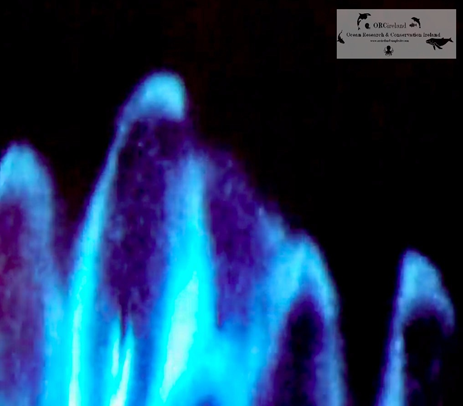GLOW IN THE DARK DOLPHINS - Common dolphins observed in bioluminescence.
GLOW IN THE DARK DOLPHINS
Emer Keaveney | 14th October 2017
Cetaceans are generally considered fundamentally difficult to study due to the great proportion of time the animals spend below the surface of the water and the requirement for adequate sighting conditions i.e., appropriate light, good visibility, low wind speed and low swell, which are considered ideal conditions to increase the chances of an observation when a cetacean does surface to breathe. Here we report an observation of short-beaked common dolphins (Delphinus delphis) at night amidst a bioluminescent algal bloom caused by the zooplankton (Noctiluca scintillans), commonly known as sea sparkle in the Celtic Sea, Ireland.
Here we report a cetacean sighting of short-beaked common dolphins (Delphinus delphis) at night amidst a bioluminescent algal bloom caused by the zooplankton (Noctiluca scintillans), commonly known as sea sparkle in the Celtic Sea, Ireland.
Between the 5th and 8th of October 2017, an opportunistic survey for cetaceans was carried out on-board "Radiance" of "Baltimore Angling and Wildlife Tours" in the Celtic Sea. On the 6th of October we observed a minke whale (Balaenoptera acutorostrata) offshore in the Celtic Sea. We also had five sightings of short beaked common dolphin (Delphinus delphis) bow riding the vessel at various stages throughout the day. At 10 p.m. on the 8th of October we observed four common dolphin in the dark in bioluminescent waters by the Kinsale Gas Fields, 23.3 nm off the south coast of Ireland. An angler on-board "Nicky Fitzgerald", described the trip as "magical" explaining to a friend on the phone that "we just saw glow in the dark dolphins!".
Neon flashes of light in moving water observed along the south and east coast of Ireland is a rare and natural phenomenon, caused by the biological production of light or bioluminescence. In Irish waters, bioluminescence is caused by the dinoflagellate commonly known as sea sparkle (Noctiluca scintillans):
According to the Marine Institute, sea sparkle is a single cell organism associated with high temperatures. Cells are large, 200 -2000µm in diameter, and visible to the naked eye. They are sub-spherical to kidney shaped, have a tentacle and a flagellum. Their blooms are orange/ red in colour and causes bioluminescence at night. On decaying, the blooms may cause levels of ammonia to surge in the water column leading to finfish and shellfish mortalities. Sea sparkle is cosmopolitan in distribution.
Sea sparkle has the ability to generate biological light or bioluminescence by mixing two natural chemicals within its body when disturbed. This phenomenon is a global occurrence and can be seen in Irish waters in late summer and early autumn when Noctiluca is most likely to prevail.
Bioluminescence has been observed by locals in Ventry Kerry, in October 2015 (www1), by Kayakers in Castlehaven Bay in south-west Cork in 2012, who reported “a fabulous glistening glow in the water” and by swimmers in Killiney Bay in Dublin in October 2009, having reported an aquatic light show, where moving water was illuminated by a “glow-in-the-dark” plankton; a floating bloom of algae which fires up into a fluorescent sparkle when disturbed. Similar reports of a large bloom of algae were observed off the south-east, around Dunmore East, Co. Waterford, in 2004.
Bioluminescence is prevalent in the marine environment worldwide, and can be found in various organisms, including, planktonic bacteria and protozoa, many invertebrates, and vertebrates with specialized light producing organs that possess symbiotic bioluminescent bacteria (Haddock et al ., 2010).
Although marine bioluminescence can vary in colour from blue to red, it is predominantly blue and, therefore, is on wavelengths that travel furthest through the water. The production of light in phytoplankton occurs from a chemical reaction in the presence of oxygen, in organelles known as scintillons that contain a substrate called “luciferin”, and the enzyme “luciferase”
Bioluminescence is a rarely observed phenomenon and so this report, highlights the contribution of eco-tour vessels to provide an adequate platform for opportunistic cetacean and wildlife surveys.
SHARE THIS ARTICLE















